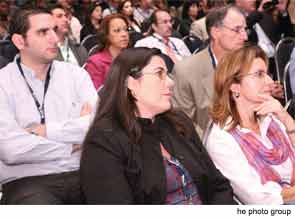
WASHINGTON—Conducting research based in your own medical practice can be a fulfilling pursuit, yielding findings that are much more practical and applicable to the real world than other kinds of research, said otolaryngologists with CHEER, a practice-based research network, during a panel here at the 2012 Annual Meeting of the American Academy of Otolaryngology-Head and Neck Surgery, held Sept. 9–12.
CHEER, which stands for Creating Healthcare Excellence through Education and Research, is designed to help doctors busy with daily clinical practice get research projects off the ground, acting as an information source and, in some cases, a source of funding. The group comprised 12 academic sites and 12 private practice sites throughout the country, totaling 200 otolaryngologists, 100 audiologists and 50 speech language pathologists.
The idea behind the program is to generate new, meaningful research that might not otherwise have happened, the network’s staff says. “‘Practice-based’ means that we are going to focus on questions and priorities that are important to the daily practitioner,” said David Witsell, MD, the principal investigator with CHEER and director of the Duke Voice Care Center in Durham, N.C. “That’s where most of medicine is practiced. Most of otolaryngology is out in the community and, to do real practice-based research, we need to involve the practitioners and understand their priorities, questions and problems.”
He said the network sets out to work on projects with “sufficient diversity such that you can generalize the results, [that] the results are important [and] impactful, and that they’re generalizable across a wider proportion of our health care community.” He likened practice-based research to Silly Putty, saying, “We can really begin to model that in ways that are very different from the typical clinical research model that we have learned in the past.”
Very little research—only about 14 percent, Dr. Whitsell said—ever gets incorporated into actual practice, and the research that does waits 17 years for that to happen. This lag shows that there must be some kind of gap. “Does the new information translate?” he said. “Is it communicated? Are there conversations going on between the investigators, the clinical scientists and the community?”

A Variety of Projects
Studies underway include an AAO-HNSF-funded study exploring awareness of and barriers to the implementation of the recently published AAO-HNSF sudden hearing loss guidelines. In another effort, the National Institute on Deafness and Other Communication Disorders is funding a study on the use of voice therapy and the perceptions and barriers that exist from the perspective of both patients and providers.
Jerry Schreibstein, MD, an otolaryngologist who has been in private practice in western Massachusetts for 18 years, said being involved in the network has been worth it. “I call myself a non-academician who still likes to be involved in clinical research and be challenged academically,” he said. For the required training in Virginia, a good balance has been struck, with a doctor sacrificing a few days for the visit and the network covering the travel arrangements and expenses, he said. “We feel that’s a nice balance and really doesn’t hurt us too much on the financial end, but it gives a great resource to the practice,” he said.
Kris Schulz, MPH, the CHEER project leader and co-investigator, said there are resources available for a wide variety of pursuits. “Whatever your degree of involvement is and your desire, whether it’s more to have the academic engagement or if you want to wet your feet or do a grant or manuscript, we can provide that support,” she said.
The Basis of Clinical Practice
Dr. Witsell said there are plenty of reasons clinicians should take more interest in practice-based research. For one, this is the kind of research that helps form the basis of the clinical practice itself. Additionally, it gives doctors a chance to collaborate both inside and outside of their own communities and provides an outlet for what he calls “clinical curiosity.” There are plainly practical reasons as well. It’s a way to explore your own biggest challenges and questions in the patient-care dilemmas you face every day, he said.
That said, the main challenges to conducting this type of research are resources and time, along with the difficulty of customizing the approach so that it can be entwined with daily practice and the result isn’t just lost investment. But, Dr. Witsell said, under the right guidance, the payoff can be great. “We want to attack questions that are dealt with on a daily basis,” he said, “and are important.”
For more information on how to get involved with the network, visit www.cheerresearch.org and click on “Contact Us.”
Leave a Reply